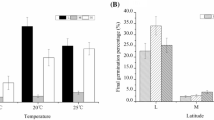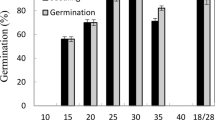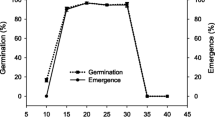Abstract
Plant invasion causes changes in floristic composition, and structural and functional degradation of tropical rainforest, which is driven by global changes, deforestation and habitat fragmentation, with temperature increasing as a marked trait in rainforest remnants. Here, we hypothesized that microclimate change, particularly increased temperature, is a major driver for plant invasion to tropical rainforest. Laboratory and field experiments were designed to investigate the germination ecology and high-temperature tolerance of intermediate seeds from three species: Cinnamomum burmanni, Citrus maxima, and Coffea arabica, which are cultivated in Xishuangbanna, tropical China though not native. It was found that the seeds all exhibited sensitivity to high-temperature, including low germination when incubated at ≥ 35 °C or ≥ 9 h daily warm period at 40 °C, and viability loss after ≥ 4 d continuous heating at 40 °C or 30-min heating at temperature ≥ 50 °C, although with interspecific variations. Meanwhile, these species demonstrated a strong preference for forest habitats during plant regeneration from seeds, including higher germination percentage and longer seeds and seedling survival under forest conditions. Overall, intermediate seeds had high-temperature sensitivity, close to or slightly lower than recalcitrant seeds, but markedly higher than orthodox seeds of pioneer and weed species previously reported. We suggest that Cinnamomum burmanni, Citrus maxima, and Coffea arabica all have the potential to enter Xishuangbanna tropical rainforests.








Similar content being viewed by others
Data availability
The datasets used and/or analyzed during the current study are available from the corresponding author on reasonable request.
References
Barrios D, Sánchez JA, Flores J, Jurado E (2020) Seed traits and germination in the Cactaceae family: a review across Americas. Bot Sci 98:417–440. https://doi.org/10.1729/botsci.2501
Brook BW, Sodhi NS, Ng PKL (2003) Catastrophic extinctions follow deforestation in Singapore. Nature 424:420–423. https://doi.org/10.1038/nature01795
Bruna EM (1999) Seed germination in rainforest fragments. Nature 402:139. https://doi.org/10.1038/45963
Cao M, Zhu H, Wang H, Lan GY, Hu YH, Zhou SS, Deng XB, Cui JY (2008) Xishuangbanna Tropical seasonal rainforest dynamics plot: tree distribution maps, diameter tables and species documentation. Yunnan Science and Technology Press, Kunming
Daws MI, Kabadajic A, Manger K, Kranner I (2007) Extreme thermo-tolerance in seeds of desert succulents is related to maximum annual temperature. S Afr J Bot 73:262–265. https://doi.org/10.1016/j.sajb.2006.12.004
Dong B, Zhang H, Huang YF, Li RX, Liu W, Tang HM, Huang M, Zhang XH (2021) Study on seed properties and storage of Cinnamomum camphora and Cinnamomum burmanni. Jiangsu Agric Sci 49:110–115
Ellis RH, Hong TD, Roberts EH (1990) An intermediate category of seed storage behaviour? I Coffee. J Exp Bot 41:1167–1174. https://doi.org/10.1093/jxb/41.9.1167
Fine PVA (2002) The invasibility of tropical forests by exotic plants. J Trop Ecol 18:687–705. https://doi.org/10.1017/S0266467402002456
Gascon C, Williamson GB, da Fonseca GAB (2000) Receding forest edges and vanishing reserves. Science 288:1356–1358. https://doi.org/10.1126/science.288.5470.1356
Joshi AA, Mudappa D, Raman TRS (2009) Brewing trouble: coffee invasion in relation to edges and forest structure in tropical rainforest fragments of the Western Ghats, India. Biol Invasions 11:2387–2400. https://doi.org/10.1007/s10530-009-9423-6
Lake JC, Leishman MR (2004) Invasion success of exotic plants in natural ecosystems: the role of disturbance, plant attributes and freedom from herbivores. Biol Conserv 117:215–226. https://doi.org/10.1016/S0006-3207(03)00294-5
Lang ARG (1967) Osmotic coefficients and water potentials of sodium chloride solutions from 0 to 40 °C. Aust J Chem 20:2017–2023. https://doi.org/10.1071/CH9672017
Li YH (1996) List of Plants in Xishuangbana. Yunnan Minzu Press, Kunming
Li HM, Ma YX, Liu WJ, Liu WJ (2009) Clearance and fragmentation of tropical rain forest in Xishuangbanna, SW, China. Biodivers Conserv 18:3421–3440. https://doi.org/10.1007/s10531-009-9651-1
Liu WJ, Li QJ, Zhang GM, Shi JP, Bai KJ (2000) Microclimatic characteristics of canopy gaps in Shorea chinensis forest in Xishuangbanna. Acta Phytoecologica Sinica 24:356–361 (in Chinese with English abstract)
Liu WJ, Tang JW, Bai KJ (2001) Microclimate edge effects within and between Shorea chinensis forest fragments in Xishuangbanna. Acta Phytoecologica Sinica 25:616–622 (in Chinese with English abstract)
Liu K, Eastwood RJ, Flynn S, Turner RM, Stuppy WH (2008) Seed Information Database (release 7.1, May 2008). http://www.kew.org/data/sid. Accessed 15 Oct 2022
Ma YX, Liu YH, Zhang KY (1998) On microclimate edge effects of tropical rainforest fragments in Xishuangbanna. Acta Phytoecologica Sinica 22:250–255 (in Chinese with English abstract)
Mandák B (2003) Germination requirements of invasive and noninvasive Atriplex species: a comparative study. Flora 198:45–54. https://doi.org/10.1078/0367-2530-00075
Michel BE (1983) Evaluation of water potentials of solutions of polyethylene glycol 8000 both in the absence and presence of other solutes. Plant Physiol 72:66–70. https://doi.org/10.1104/pp.72.1.66
Olvera-Carrillo Y, Márquez-Guzmán J, Barradas VL, Sánchez-Coronado ME, Orozco-Segovia A (2003) Germination of the hard seed coated Opuntia tomentosa S.D., a cacti from the México valley. J Arid Environ 55:29–42. https://doi.org/10.1016/S0140-963(02)00268-9
Pérez-Sánchez RM, Jurado E, Chapa-Vargas L, Flores J (2011) Seed germination of Southern Chihuahuan Desert plants in response to elevated temperatures. J Arid Environ 75:978–980. https://doi.org/10.1016/j.jaridenv.2011.04.020
Radford IJ, Cousens RD (2000) Invasiveness and comparative life history traits of exotic and indigenous Senecio species in Australia. Oecologia 125:531–542. https://doi.org/10.1007/s004420000474
Raich JW, Khoon GW (1990) Effect of canopy openings on tree seed germination in a Malaysian dipterocarp forest. J Trop Ecol 6:203–217. https://doi.org/10.1017/S0266467400004326
Ramírez-Padilla CA, Valverde T (2005) Germination responses of three congeneric cactus species (Neobuxbaumia) with differing degrees of rarity. J Arid Environ 61:333–343. https://doi.org/10.1016/j.jaridenv.2004.09.006
Rashid I, Reshi Z, Allaie RR, Wafai BA (2007) Germination ecology of invasive alien Anthemis cotula helps it synchronise its successful recruitment with favourable habitat conditions. Ann Appl Biol 150:361–369. https://doi.org/10.1111/j.1744-7348.2007.00136.x
Raven PH, Gereau RE, Phillipson PB, Chatelain C, Jenkins CN, Ulloa CU (2020) The distribution of biodiversity richness in the tropics. Sci Adv 6:eabc6228. https://doi.org/10.1126/sciadv.abc6228
Rembold K, Mangopo H, Tjitrosoedirdjo SS, Kreft H (2017) Plant diversity, forest dependency, and alien plant invasions in tropical agricultural landscapes. Bioll Conserv 213:234–242. https://doi.org/10.1016/j.biocon.2017.07.020
Tweddle JC, Dickie JB, Baskin CC, Baskin JM (2003) Ecological aspects of seed desiccation sensitivity. J Ecol 91:294–304. https://doi.org/10.1046/j.1365-2745.2003.00760.x
Waddell EH, Banin LF, Fleiss S, Hill JK, Chapman DS (2020) Land-use change and propagule pressure promote plant invasions in tropical rainforest remnants. Landscape Ecol 35:1891–1906. https://doi.org/10.1007/s10980-020-01067-9
Wen B (2015) Effects of high temperature and water stress on seed germination of the invasive species Mexican Sunflower. PLoS ONE 10:e0141567. https://doi.org/10.1371/journal.pone.0141567
Wen B (2019) Seed germination ecology of Alexandra palm (Archontophoenix alexandrae) and its implication on invasiveness. Sci Rep 9:4057. https://doi.org/10.1038/s41598-019-40733-0
Wen B, Cai YF (2014) Seed viability as a function of moisture and temperature in the recalcitrant rainforest species Baccaurea ramiflora (Euphorbiaceae). Ann Forest Sci 71:853–861. https://doi.org/10.1007/s13595-014-0388-y
Wen B, Yang PR (2021) Implications of seed germination ecology for conservation of Camptotheca acuminata, a rare, endemic, and endangered species in China. Plant Ecol 222:209–219. https://doi.org/10.1007/s11258-020-01099-w
Wen B, Cai CT, Wang RL, Tan YH, Lan QY (2010) Critical moisture content windows differ for the cryopreservation of pomelo (Citrus grandis) seeds and embryonic axes. CryoLetters 31:29–39
Wen B, Liu MH, Tan YH, Li Q (2016) Sensitivity to high temperature and water stress in recalcitrant Baccaurea ramiflora seeds. J Plant Res 129:637–645. https://doi.org/10.1007/s10265-016-0810-7
Ye J, Wen B (2017) Seed germination in relation to the invasiveness in spiny amaranth and edible amaranth in Xishuangbanna SW China. PLoS ONE 12:e0175948. https://doi.org/10.1371/journal.pone.0175948
Yuan X, Wen B (2018) Seed germination response to high temperature and water stress in three invasive Asteraceae weeds from Xishuangbanna SW China. PLoS ONE 13:e0191710. https://doi.org/10.1371/journal.pone.0191710
Zhang YP (2002) The climatic characteristics in Xishuangbanna Menglun. Stud Trop Plants 47:62–65 (in Chinese with English abstract)
Zhu H, Xu ZF, Wang H, Li BG (2004) Tropical rain forest fragmentation and its ecological and species diversity changes in southern Yunnan. Biodiversity Conserv 13:1355–1372. https://doi.org/10.1023/B:BIOC.0000019397.98407.c3
Zhu H, Wang H, Zhou SS (2010) Species diversity, floristic composition and physiogenmy changes in a rainforest remnant in Southern Yunnan, China after 48 years. J Trop for Sci 22:49–66
Funding
We are grateful to the National Natural Science Foundation of China (Grant No. 31971573) for providing financial support for this research, and the Seedbank of Xishuangbanna Tropical Botanical Garden is thanked for the laboratory experiments that were performed there.
Author information
Authors and Affiliations
Contributions
BW and LGC outlined the research, XJA and LY collected the data, XJA analyzed the data and wrote the paper, BW reviewed the paper and all authors commented substantially on the manuscript.
Corresponding authors
Ethics declarations
Conflict of interest
The authors declared that there were no competing interests.
Additional information
Communicated by Dafeng Hui.
Publisher's Note
Springer Nature remains neutral with regard to jurisdictional claims in published maps and institutional affiliations.
Supplementary Information
Below is the link to the electronic supplementary material.
Rights and permissions
Springer Nature or its licensor (e.g. a society or other partner) holds exclusive rights to this article under a publishing agreement with the author(s) or other rightsholder(s); author self-archiving of the accepted manuscript version of this article is solely governed by the terms of such publishing agreement and applicable law.
About this article
Cite this article
An, X., Yang, L., Wen, B. et al. Seed high-temperature sensitivity and germination ecology in intermediate seeds of three species from Xishuangbanna, tropical China. Plant Ecol 224, 647–658 (2023). https://doi.org/10.1007/s11258-023-01331-3
Received:
Accepted:
Published:
Issue Date:
DOI: https://doi.org/10.1007/s11258-023-01331-3




